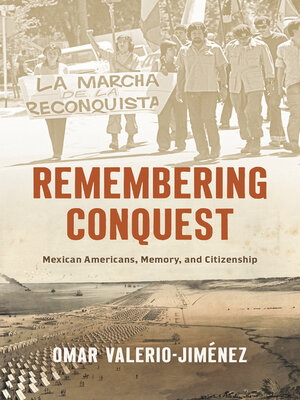Remembering Conquest
ebook ∣ Mexican Americans, Memory, and Citizenship · The David J. Weber Series in the New Borderlands History
By Omar Valerio-Jiménez

Sign up to save your library
With an OverDrive account, you can save your favorite libraries for at-a-glance information about availability. Find out more about OverDrive accounts.
Find this title in Libby, the library reading app by OverDrive.



Search for a digital library with this title
Title found at these libraries:
| Library Name | Distance |
|---|---|
| Loading... |
This book analyzes the ways collective memories of the US-Mexico War have shaped Mexican Americans' civil rights struggles over several generations. As the first Latinx people incorporated into the nation, Mexican Americans were offered US citizenship by the Treaty of Guadalupe Hidalgo, which ended the war. Because the 1790 Naturalization Act declared whites solely eligible for citizenship, the treaty pronounced Mexican Americans to be legally white. While their incorporation as citizens appeared as progress towards racial justice and the electorate’s diversification, their second-class citizenship demonstrated a retrenchment in racial progress. Over several generations, civil rights activists summoned conquest memories to link Mexican Americans' poverty, electoral disenfranchisement, low educational attainment, and health disparities to structural and institutional inequalities resulting from racial retrenchments. Activists also recalled the treaty’s citizenship guarantees to push for property rights, protection from vigilante attacks, and educational reform.
Omar Valerio-Jiménez addresses the politics of memory by exploring how succeeding generations reinforced or modified earlier memories of conquest according to their contemporary social and political contexts. The book also examines collective memories in the US and Mexico to illustrate transnational influences on Mexican Americans and to demonstrate how community and national memories can be used strategically to advance political agendas.
Omar Valerio-Jiménez addresses the politics of memory by exploring how succeeding generations reinforced or modified earlier memories of conquest according to their contemporary social and political contexts. The book also examines collective memories in the US and Mexico to illustrate transnational influences on Mexican Americans and to demonstrate how community and national memories can be used strategically to advance political agendas.







